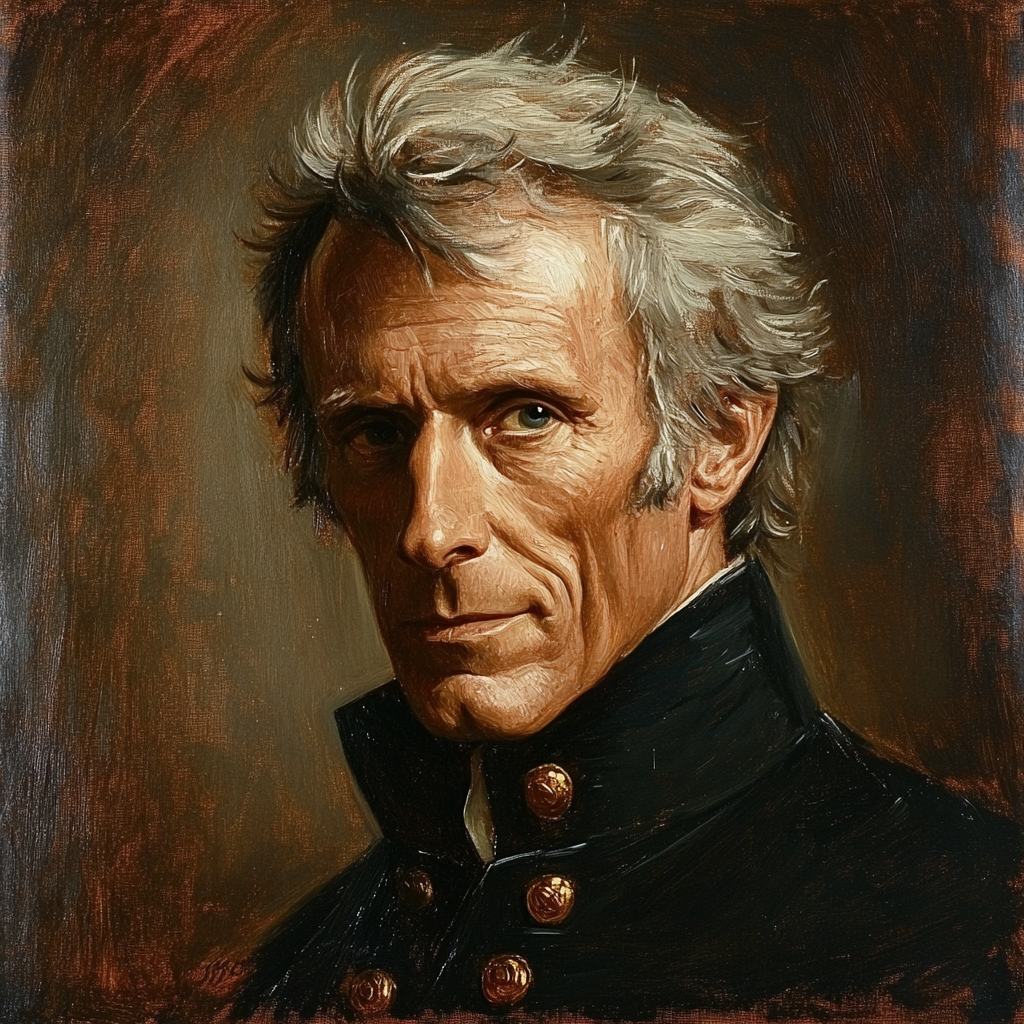Andrew Jackson was President of the Union of American States from 1829-1839.
The Presidency of Andrew Jackson (1829 – 1839)
The General-Turned-Tyrant: Militarization, Mass Executions, and the Rise of the Imperial Union
1829: Jackson’s Election—The First Fully Rigged Presidency
Andrew Jackson, a war hero and brutal enforcer of the aristocracy, was installed as President in 1829 following James Monroe’s endorsement. By this point, elections were purely ceremonial, with the Planter Council selecting the candidate long before the first vote was cast.
Unlike Monroe, who at least pretended to be a constitutional leader, Jackson made no such illusions. He openly declared himself the military protector of the aristocracy, stating in his inauguration speech:
“The people of the Union are but subjects of a greater order, bound by duty to serve, to labor, and to obey. Our strength lies not in feeble democracy, but in discipline, tradition, and blood.”
His presidency would transform the Union into a fully militarized state, one that relied on violence and mass executions to maintain power.
1830-1832: The Suppression Wars & The Expansion of Private Militias
Upon taking office, Jackson crushed all remaining opposition—not just from abolitionists and laborers, but from anyone who even questioned aristocratic rule.
- 1830: Jackson nationalized all plantation militias, merging them into an official force known as the Enforcement Corps.
- 1831: He launched the Suppression Wars, a brutal campaign targeting:
- Escaped slaves and free Black communities who had settled in isolated pockets across the Union.
- Dissident landowners who questioned the growing power of the Planter Council.
- Religious minorities who resisted forced labor systems.
- By 1832, Jackson had executed tens of thousands, marking the largest state-sanctioned purge in Union history.
1833-1835: The Grand Reorganization—Turning the Union into an Imperial State
Jackson saw the aristocracy as the ruling class, but he believed that a militarized government was necessary to maintain order. Thus, he reorganized the Union’s structure, giving it a more centralized, imperial model:
- 1833: The Planter Council was given official legislative authority, meaning all governance now rested with the richest families.
- 1834: Jackson formalized a caste system, legally defining all citizens into one of three groups:
- The Ruling Class – Landowners and members of the Planter Council.
- The Servant Class – Free but entirely dependent on the landowners.
- The Indentured & Enslaved – All others, including laborers and non-whites, who had no legal rights.
- 1835: A new Imperial Charter was drafted, making the President a lifelong position, only removable by the Planter Council.
By the end of 1835, the Union was no longer just an aristocracy—it was a militarized empire in all but name.
1836-1838: The Expansion of Forced Labor & The Death of the Underground Networks
Jackson’s most infamous policies revolved around the mass expansion of forced labor.
- 1836: He created “Industry Districts”, where laborers were sent to factories under armed guard—effectively industrialized slavery.
- 1837: He expanded the bounty system, granting rewards for capturing not just fugitives, but their entire families.
- 1838: The final Underground Exodus was crushed, as the last major escape networks were dismantled. Those caught were not just executed, but made into public examples—their bodies displayed as warnings in major cities.
The dream of freedom for millions in the Union died under Jackson.
1839: Jackson’s Final Year & His Ominous Warning
By 1839, Jackson was old and increasingly paranoid. He saw enemies everywhere—even among his own allies.
- He began executing high-ranking aristocrats, believing them to be plotting against him.
- He warned the Planter Council that “The greatest threat to the Union is itself.”
- On his deathbed, he reportedly said:
“This empire will one day fall, not to outsiders, but to its own hunger.”
Legacy of Andrew Jackson’s Presidency
- Turned the Union into a militarized aristocracy.
- Destroyed the last remaining escape networks.
- Created a formal caste system, cementing a class-based society.
- Executed tens of thousands to maintain order.
- Laid the groundwork for the Union’s eventual collapse.
Jackson was not just a tyrant—he was the architect of the Union’s imperial order. His rule created a system so rigid, so violent, that it would ultimately consume itself.
His successor, John C. Calhoun, would take this system even further, leading to the complete dismantling of all pretenses of democracy.

